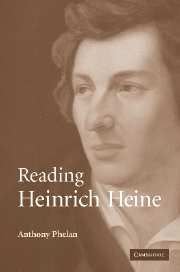11 - The tribe of Harry: Heine and contemporary poetry
Published online by Cambridge University Press: 22 September 2009
Summary
In this final chapter I shall ask how some contemporary poets have read Heine, as they take up and extend his poetic practice. The investigation takes its cue from English poetry and the tribe of Ben celebrated by Ben Jonson in his ‘Epistle to one who would be sealed of the tribe of Ben’. For the poet's followers, membership of the tribe (who were also known as the Sons of Ben) came to signify a certain set of aesthetic commitments, to convivial wit and to the plain style – and, in the poem that commemorates their solidarity, to a certain degree of resistance to ‘the animated porcelain of the court’. For a number of reasons a tribe of Harry Heine provides an appropriate term with which to assess Heine's poetic posterity. The Romanzero poem ‘Jehuda ben Halevy’ shows the extent to which the fate of poetry, in its transmission to subsequent generations, is an important question for Heine himself. Just as Heine's reverence, in that poem, for the Jewish poets of medieval Spain amounts to a self-definition as their modern avatar, so too among contemporary poets Heine will prove to be more than a formal model for modern appropriation. Secondly, the notion of a tribe of Harry raises the question of filiation in relation to Heine's reception in the twentieth century.
- Type
- Chapter
- Information
- Reading Heinrich Heine , pp. 245 - 264Publisher: Cambridge University PressPrint publication year: 2007

